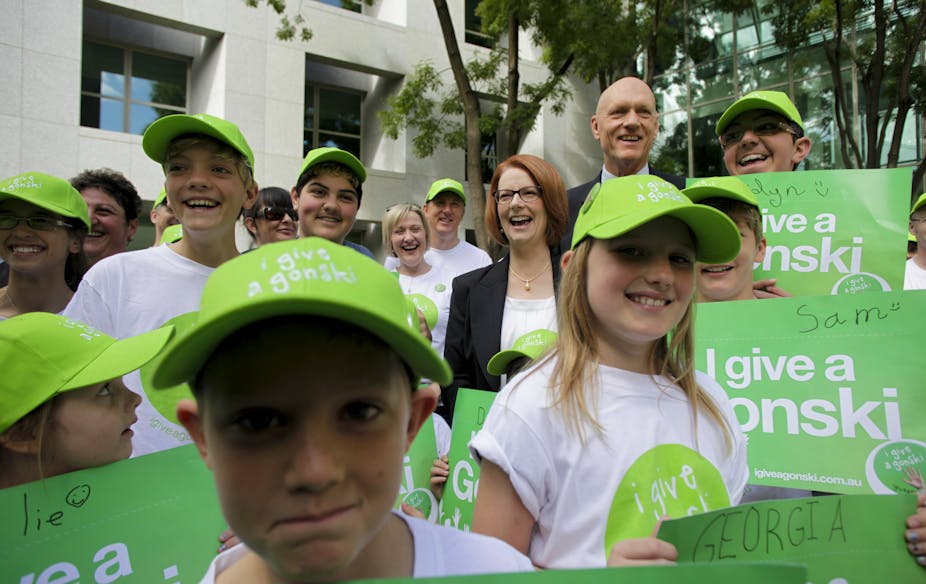On Sunday the federal Labor government announced reforms to school funding, that aimed to finally put in place the recommendations of the Gonski review.
The proposed reforms – worth A$14.5 billion – are to be partly funded by the states and by federal cuts to higher education.
Labor’s package and the response to it can tell us a lot about the current politics of education. Labor is, after all, the party that voters associate with public education but in an era of fiscal conservatism it struggles to deliver on expectations. The result is disillusion to the left and right.
It was Gough Whitlam who closely identified Labor with the case of education, but it is in recent years that education has come to adopt a central position in Labor rhetoric. With socialism in the past, Labor is no longer distinctive on economic policy (apart from broadband and car industry subsidies), and the party has also moved away from the “cultural left” causes of multiculturalism, republicanism and indigenous rights supported by the Hawke-Keating governments.
On these issues it has sought consensus with the conservatives, largely on their terms. Education has come to substitute for other aspects of social policy and rhetorical critiques of some of the ultra-rich notwithstanding, Labor aims to alter social conditions by education alone.
The Australian Election Study has found that voters consider education an important issue, although it has usually ranked well behind health.
In 2010, 12.6% of voters claimed education was the most important issue in determining their vote third only to health with 23% and economic management with 21.1%. Voters consistently claim by a margin of about two to one that their choices are more based on policy than general evaluations of a political party.

Labor’s partisans thus hope that if voters can be persuaded to focus on policy rather than their general sense of grievance Labor can recover support. Labor has always, except in 1996, been the party that voters preferred on education, usually by large margins.
It is the case that when policy matters seem to be front and centre for voters Labor does well. Labor won in 1993 and 2007 when policy issues concerned voters. Notable Coalition victories in 1996 and 2004 largely reflected a general reaction against Labor in 1996 and contentment with prosperity in 2004 rather than approval for distinctive Howard era policies such as the GST or privatisation.
A problem for Labor is that voters’ claims to be concerned with policy should be taken with some scepticism. At least in part when voters feel positively or negatively about a party they tend to adjust their view of its policy performance accordingly.
Defenders of the Gillard government are fond of pointing to its legislative record, but voters are unenthused by Labor overall. Mark Latham focused on education in 2004 but Labor’s advantage over the Coalition on this issue notably declined.
Many in the media have blamed Labor’s problems on inept leadership, but even the most brilliant leader will fail when voters are disillusioned with the policy record of a government.
Labor’s overall political model – what sociologists Shaun Wilson and Ben Spies-Butcher called “low-tax social democracy” – is in crisis. Julia Gillard is an Australian example of what the American presidential studies scholar Stephen Skowronek has called a “late-regime” leader.
In the American context these are Presidents such as Herbert Hoover or Jimmy Carter. Their approach to politics is technocratic rather than ideological. Former Labor minister Lindsay Tanner has argued that even when modern Labor proposes major policy initatives they are usually developed outside of the labour movement, unlike the Accord or superannuation policy or university restructuring during the Hawke-Keating era.
The Gillard reforms to school funding follow on an external review. Disability insurance largely derived from a blueprint developed by the Productivity Commission.
Late-regime leaders, Skowronek argues, often accumulate an impressive legislative record, but are emphatically rejected by voters in search of an alternative. Gillard seems destined to suffer this fate.
If education is to achieve the ambitious social goals that modern Labor expects, it requires more resources. Modern Labor, however, is committed to a small public sector, and in government Gillard has closed off revenue options by her compromises on taxation.
After the 2008 Bradley report, Labor committed itself to ambitious targets to improve university participation from working-class students. Reductions to university funding endanger the support that disadvantaged students require.
At the same time public opinion, perhaps in response to economic uncertainty, has become more conservative. Some 94% of respondents in a recent survey claimed they would not pay more tax to fund the Gonski reforms.
Labor faces the danger that it has raised public expectations but that it has failed to deliver. The result for social democrats is a vicious circle, policy failure generates public hostility to the measures required to correct this failure.

